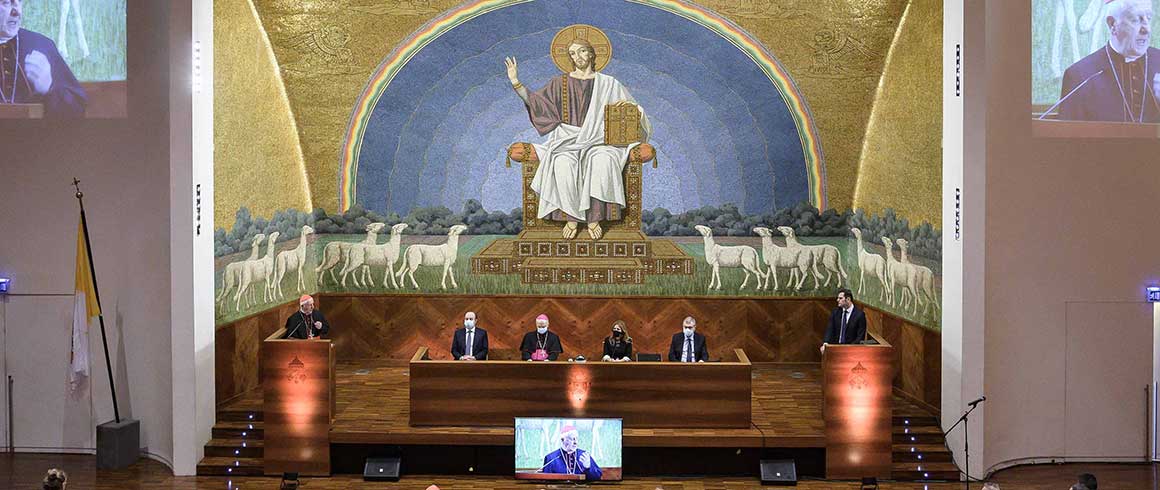“To educate is to bet on and to bring hope into the present”. This is only one of the crucial passages of the video message, released on Thursday, October 15 at the Pontifical Lateran University, in which Pope Francis invites representatives of institutions and the cultural world to sign the “Global Compact on Education”, a global educational pact that everyone will engage in implementing in their own sphere and spread as much as possible to produce a «change in the current development model».
Università Cattolica del Sacro Cuore is one of the four universities worldwide charged with this commitment. «Four paths of work have been chosen», said Monsignor Angelo Vincenzo Zani, Secretary of the Congregation for Catholic Education of the Holy See. «The first relates to human dignity and human rights, the second to peace and citizenship, the third to integral ecology, and the fourth to fraternity and development. And, for each of these four areas, four universities have been chosen to lead a network of universities not only Catholic, ecclesiastical, but also of other cultural and religious expressions - such as Buddhist and Muslim - that will soon continue this work of research, project proposals and sharing».
In response to the invitation made by Pope Francis, Università Cattolica has created the Observatory for Education and International Cooperation. It was announced by our Rector Franco Anelli, during the meeting promoted in Rome by the Congregation for Catholic Education.
Headed by Professor Domenico Simeone, who also holds the UNESCO Chair at Università Cattolica for “education for human development and solidarity among peoples”, this «will be a tool for dialogue with the other universities that are involved in this project», said Anelli. This is an addition to the activities of other departments of Università Cattolica (University Centre for International Solidarity, University Centre for Social Doctrine of the Church, Graduate School of Environmental Studies), which for some time, through a "multidisciplinary effort", have been dealing with educational issues in line with what wished for in Laudato Si’, which invites us to work together to protect «our common home».
«These are peculiar centres in which the skills of professors from different faculties and departments combine together trying to structure research or third mission activities which have a multidimensional connotation and an ability to understand the complexity of reality that, as we know, can hardly be organised according to the criteria of the scientific sectors», Rector Anelli said. All this is in the perspective of «an approach according to “universitas”, for a widespread culture that means a conscious approach to citizenship and a rediscovery of the general cultural and global dimension that is at the origin of the universities themselves».
According to recent UNESCO estimates, even before the Covid-19 pandemic, about 17% of children, adolescents and young people around the world were completely excluded from education. However, educational opportunities continue to be unevenly distributed around the world.
The Observatory for International Education and Cooperation aims to foster collaboration among universities, research centers and international organisations to promote studies, research, educational activities and publications on education, and international cooperation, developing new analysis and investigation tools that will enable the creation of a pedagogy for international cooperation based on the ethic principles of responsibility and solidarity, in the light of the Social Doctrine of the Church.
«The idea is to create a global benchmark to promote processes of international cooperation in favour of education around the world, addressing what is Goal 4 of the UN Agenda 20/30, which indicates quality education for all as the ultimate goal to be achieved», said Domenico Simeone, professor of General Pedagogy at Università Cattolica «To do this it is also necessary to promote researching this field, to promote dialogue and debate. The idea is that there mustn’t be unidirectional communication but rather dialogue, meeting, debate where different educational perspectives that arise from different cultural contexts can also be compared from different countries. The Pope says it very well: We must be careful about a sort of cultural colonisation. What can really enrich everyone is mutual exchange».
According to Monsignor Claudio Giuliodori, General Ecclesial Assistant of Università Cattolica del Sacro Cuore, who was among the speakers at the webinar organised by the University on the same day of the diffusion of the Holy Father's video message on the Global Compact on Education, "the Global Education Pact intends to face the great challenges of our times: from environmental challenges to issues related to poverty, misery and marginalisation. Therefore, in the face of all this, «progress can only be made if there is a global commitment, shared from the point of view of education». A commitment, added Monsignor Giuliodori, who sees Università Cattolica «on the front line» for its «constant attention to the Pontiff’s teachings, to the work of the Congregation for Catholic Education, and also for the daily work it does from an educational point of view with the new generations».


